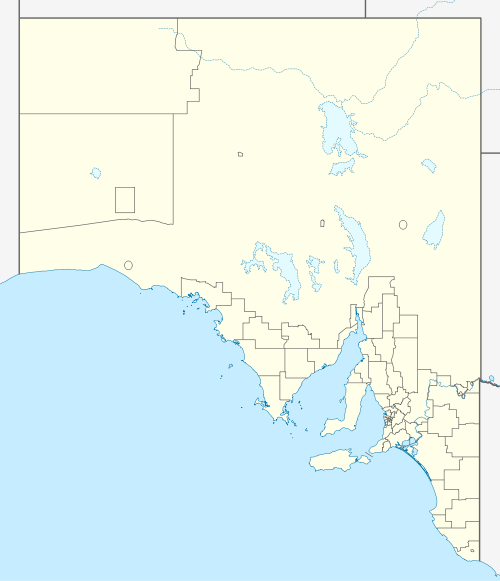Koppio
Koppio is a locality in the Australian state of South Australia located on the Eyre Peninsula about 256 kilometres (159 mi) west of the state capital of Adelaide and about 32 kilometres (20 mi) north of Port Lincoln,[3] and within the Tod River catchment area. While long-established agricultural activities dominate (including sheep, cattle and buffalo grazing and wheat cropping) the region is also prospective for graphite and iron ore. The Koppio Smithy Museum is a local tourist attraction replete with buildings and artifacts representing the early pioneer heritage of Eyre Peninsula.
| Koppio South Australia | |||||||||||||||
|---|---|---|---|---|---|---|---|---|---|---|---|---|---|---|---|
 Koppio | |||||||||||||||
| Coordinates | 34°25′18″S 135°50′48″E | ||||||||||||||
| Population | 63 (2016 census)[1] | ||||||||||||||
| Established | 1998[2] | ||||||||||||||
| Postcode(s) | 5607[3] | ||||||||||||||
| Time zone | ACST (UTC+9:30) | ||||||||||||||
| • Summer (DST) | ACST (UTC+10:30) | ||||||||||||||
| Location |
| ||||||||||||||
| LGA(s) | District Council of Tumby Bay[2] | ||||||||||||||
| Region | Eyre Western[4] | ||||||||||||||
| County | Flinders[4] | ||||||||||||||
| State electorate(s) | Flinders[5] | ||||||||||||||
| Federal Division(s) | Grey[6] | ||||||||||||||
| |||||||||||||||
| |||||||||||||||
| Footnotes | Locations[3] Adjoining localities[2] | ||||||||||||||
Mining and mineral exploration
Companies actively exploring the area early in the 21st century included Eyre Iron Pty Ltd (a joint venture of Centrex Metals Ltd) and Lincoln Minerals Ltd.[8][9] Eyre Iron's proposed Fusion Magnetite Project was the most advanced prospective mine development project in the area. Graphite was first mined in the area in 1866. The Koppio Graphite Mine originally operated in the early 1900s and was revisited between 1941 and 1944.[10]
Koppio Smithy Museum
The Koppio Smithy Museum is a 1.0 hectare (2.5 acres) property managed by the National Trust of South Australia[11] which features a collection of early colonial buildings and heritage artifacts collected from across Eyre Peninsula. The entrance is via the old Smithy's cottage, constructed by Tom Brennand after he migrated to the region from Lochiel in 1903.[12] One of the museum's oddities is a replica World War I tank, which was abandoned in the sand dunes of Coffin Bay after its use in the feature film The Lighthorsemen. As of 2014, the museum is open to the public from 10 am until 5 pm Tuesday through Sunday and entry is $10 for adults and $4 for concessions.[13]
Exhibits
The museum includes the following exhibits:[12]
- Blacksmith shop and two-bedroom cottage (restored)
- 'Glenleigh' thatch cottage (1890)
- Koppio one-teacher schoolhouse (1934 to 1970)
- A unique collection of very early Aboriginal artefacts
- Port Lincoln tailor shop (1910)
- Bank of Adelaide building
- White Flat Post Office (reportedly the smallest Post Office in South Australia),
- Heritage Hall (Jericho family collection)
- Display sheds featuring: tractors & farm machinery, stationary engines, shearing, grain story, hay story, vehicles
- Print Room
Koppio Cemetery
The Koppio Cemetery contains 36 plots, with the earliest grave dating from 1866.[14]
Governance
Koppio is located within the federal Division of Grey, the state electoral district of Flinders and the local government area of the District Council of Tumby Bay.[6][5][2]
See also
- List of cities and towns in South Australia
- Hundred of Koppio
References
- Australian Bureau of Statistics (27 June 2017). "Koppio". 2016 Census QuickStats. Retrieved 12 January 2018.

- "Search result for "Koppio (Locality Bounded)" (Record no SA0037685) with the following layers being selected – "Suburbs and Localities", "Local Government Areas" and "Hundreds"". Department of Planning, Transport and Infrastructure. Archived from the original on 12 October 2016. Retrieved 6 March 2016.
- "Koppio, South Australia (Postcode)". postcodes-australia.com. Retrieved 6 March 2016.
- "Search results for Koppio LOCB with the following datasets selected - 'Suburbs and Localities', 'SA Government Regions' and 'Counties'". Loctation SA Map viewer. Government of South Australia. Retrieved 22 December 2017.
- "District of Flinders Background Profile". Electoral Commission SA. Retrieved 9 September 2015.
- "Federal electoral division of Grey" (PDF). Australian Electoral Commission. Retrieved 24 July 2015.
- "Monthly climate statistics: Summary statistics North Shields (Port Lincoln AWS)". Commonwealth of Australia , Bureau of Meteorology. Retrieved 12 January 2018.
- "GRAPHITE – Scoping study at Koppio-Kookaburra Gully" Asia Miner (2012-08). Retrieved 2014-01-15.
- "Koppio – Kookaburra Gully graphite" Port Lincoln Residents & Ratepayers Assoc. (2012-09). Retrieved 2014-01-15.
- Parker, Dr A. John "Koppio Graphite" Lincoln Minerals Ltd (7 December 2012). Retrieved 2014-01-15.
- "Branches SA". National Trust of Australia. Retrieved 12 January 2018.
- Koppio Smith Museum National Trust. Retrieved 2014-01-15.
- Koppio Smithy Museum – Koppio, Eyre Peninsula Archived 5 April 2015 at the Wayback Machine Postcards. Retrieved 2014-01-15.
- "Koppio" AustralianCemeteries.com Retrieved 2014-01-15.